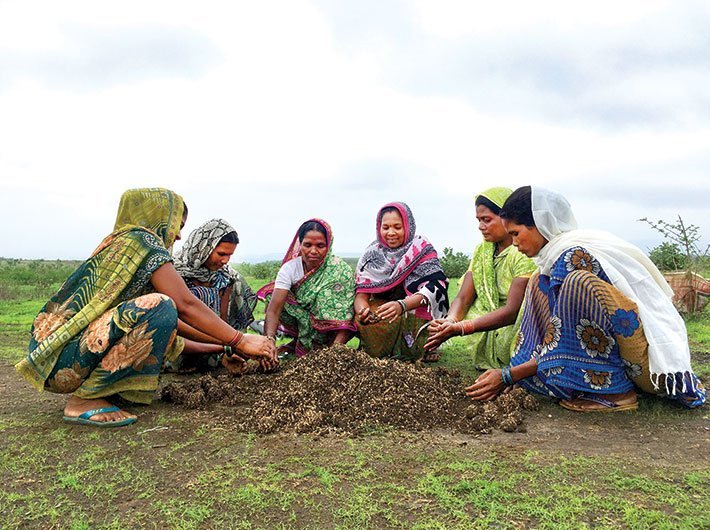New report: Recognition of FRA helped them tide over distress period: empowered gram sabha, women showed the way
In India, the third most affected country due to the Covid-19 pandemic, the poor and marginalised forest communities have faced the loss of livelihoods, employment, food insecurity and resultant socio-economic distress. The vulnerabilities, atrocities and injustices that forest communities face due to forest, conservation and economic policies increased many fold during the pandemic.
The lockdown forced large numbers of migrant workers to rush home – often amid insufferable hardships, and they included tribals and ‘other traditional forest dwellers’ (OTFD) as these communities often migrate to cities in search of better livelihood options.
Yet, there are examples of adivasi and OTFD communities coping with the crisis with remarkable resilience particularly in areas where their land and forest rights have been recognised and the gram sabhas have been empowered under the Scheduled Tribes and Other Traditional Forest Dwellers (Recognition of Forest Rights) Act 2006 (FRA) and Panchayat Extension to Scheduled Areas Act 1996 (PESA). Recognition of these rights in many cases has led to overcoming constraints and crises situations.
“Community Forest Rights and the Pandemic: Gram Sabhas Lead The Way”, a report published by team of independent researchers as part of CFR Learning and Advocacy and Vikalp Sangam initiative and released on Friday, brings out case studies to illustrate that recognition of forest rights to use and manage community forests under the FRA (Recognition of Forest Rights) Act 2006 has made it possible for many adivasi and forest dwelling communities to overcome the distress created by the Covid-19 pandemic induced lock down and address the situation.
“There are examples of adivasi and other traditional forest dwelling communities coping with crisis with remarkable resilience particularly in areas where their land and forest rights have been recognised and the gram sabhas have been empowered under The Scheduled Tribes and Other Traditional Forest Dwellers (Recognition of Forest Rights) Act 2006 (FRA) and Panchayat Extension to Scheduled Areas Act 1996 (PESA). In many cases, recognition of these rights has led to overcoming constraintsand crises situations,” the findings say.
Illustrating different case studies across regions the document reveals that that the local communities and gram sabhas better understand local complexities as compared to local administrations while dealing with a crisis situation like Covid-19 and respond faster when empowered by FRA and can restore ecosystems, create sustainable economies and community resilience to cope with the natural and human induced calamities.
The gram sabhas in Rajnandgaon of Chhattisgarh initiated a holistic Covid-19 governance plan followed by the local administrations later. The case study in Nandurbar district shows how secure tenure and empowered gram sabhas can help reduce distressed migration.
“Until 2016, a lot of people used to migrate out of Nandurbar district for work. Workers would go for six months as labourers to work in agricultural fields. However, ever since getting CFR (community forest resource ) recognition, that has stopped. During the Covid-19 lockdown villages had livelihood: in collection of forest produce, tree plantation through MGNREGA and building ponds and water harvesting for irrigation and other purposes through the CFRMCs (community forest resource management committee),” said Pratibha Shinde, member of Lok Samanvay Pratisthan, a civil society organisation.
The case studies show that ownership rights over forest produce ensured better and timely livelihood opportunities even during the lockdown. In Gondia, Maharashtra, about 50 gram sabhas were organised as a federation that guaranteed competitive prices and bonus for the communities for their MFP collection even during a crisis. The federation of 29 villages earned Rs 2.5 crore selling tendu patta, self-managing everything while taking precautions against the spread of Covid-19.
In Chamarajnagar, Karnataka, soliga adivasi communities where their rights are legally recognised these communities survived the lockdown with their honey and tubers collections.
The study also found that local knowledge and long-term conservation efforts led by the locals it created a healthy and diverse ecosystem which enabled to make the communities more resilient. In Nayagarh, Odisha, adivasi kondh communities were consuming diverse forest foods during the lockdown as they have been regenerating their natural forests for over four decades now. In Dhule, Maharashtra, communities had saved up food grains and vegetables due to their practice of self-sufficient agriculture as a way of long-term cluster development for many years now since their community forest rights were legally recognised.
In Kutch, Gujarat, local knowledge of water systems, grasses and soils allowed Maldhari pastoralists and their cattle to survive and thrive during the lockdown which coincided with a dry period.
“When local institutions like the gram sabha were empowered women played a key role in managing the crisis and the needs of other vulnerable communities like the returning migrant workers, pastoralists and particularly vulnerable tribal groups (PVTGs) were taken care of,” says the report.
In Dindori, Madhya Pradesh, women organised a system of food distribution and water collection that made sure that physical distance was maintained in the Baiga PVTG villages. In Narmada, Gujarat, gram sabhas ensured that Govaliya nomadic communities received food.
“…this was the first time when the gram sabhas were actively involved and in fact entrusted with the management and protection of the forest resources. The main challenge remains that they carry out their processes in a democratic and transparent way and continue the forest management and protection work,” said Trupti Mehta of ARCH-Vahini, a voluntary organisation active in Narmada district for long.
“On the occasion of Gandhi Jayanti, this report narrates how empowering local self-governance through the gram sabhas in adivasi areas is the first step in undoing historical injustices and towards strengthening grassroots democracy and effective natural resource management. While there have also been detrimental steps taken during the Covid-19 lockdown which aim towards environmental law amendments and forest land diversions thereby diluting the power of gram sabhas this report highlights how the governance of gram sabhas is central for managing both natural and human made crises,” the report says.

